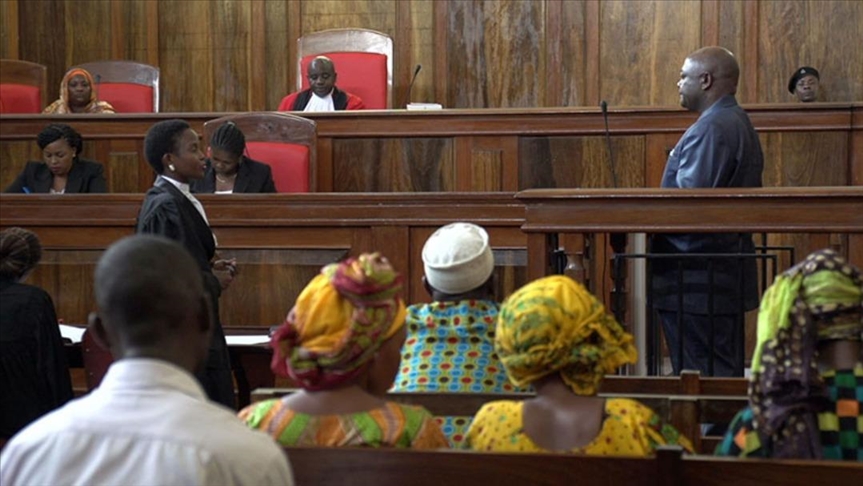East African country uses virtual court sessions, e-filing system to enhance transparency, improve citizens’ access to justice
DAR ES SALAAM, Tanzania
As part of its larger efforts to modernize the court system, Tanzania’s judiciary has implemented multi-faceted reforms to increase transparency, improve efficiency, and speed up the delivery of justice in courts that were once allegedly plagued by widespread corruption and inefficiency.
With the help of modern technology, the East African country is using digital tools such as virtual court sessions and e-filing system to enhance transparency and improve citizens’ access to justice.
Switching from a paper-based filing system to a digital format is expected to help clear a large backlog of cases and ease the burden of time-consuming legal processes and procedures, officials said.
Elisante Gabriel, chief administrator of Tanzania’s judiciary, said the ongoing reforms are aimed at ensuring that legal proceedings are operated efficiently.


Tanzania digitizes court system to speed up justice delivery
East African country uses virtual court sessions, e-filing system to enhance transparency, improve citizens’ access to justice
Kizito Makoye |17.11.2021 A Magistrate presiding over a case at Kibaha Resident Magistrate court. Photo by Kizito Makoye
A Magistrate presiding over a case at Kibaha Resident Magistrate court. Photo by Kizito Makoye
DAR ES SALAAM, Tanzania
As part of its larger efforts to modernize the court system, Tanzania’s judiciary has implemented multi-faceted reforms to increase transparency, improve efficiency, and speed up the delivery of justice in courts that were once allegedly plagued by widespread corruption and inefficiency.
With the help of modern technology, the East African country is using digital tools such as virtual court sessions and e-filing system to enhance transparency and improve citizens’ access to justice.
Switching from a paper-based filing system to a digital format is expected to help clear a large backlog of cases and ease the burden of time-consuming legal processes and procedures, officials said.
Elisante Gabriel, chief administrator of Tanzania’s judiciary, said the ongoing reforms are aimed at ensuring that legal proceedings are operated efficiently.
“We have installed computers and e-filing system at different levels to improve efficiency and effectiveness of the courts,” Elisante told Anadolu Agency.
According to him, the e-filing system that is being introduced in courts at different levels will enable litigants to file and track their cases easily.
There are over 1 million cases pending in the country’s courts. Officials estimate that about 60% of the cases has been pending for two years, and almost 40% has been pending for more than five years.
The judiciary is using cutting-edge digital technologies to save time and money, and speed up the delivery of justice as part of the initiative, which includes training court officers, building new court facilities, and introducing mobile courts to bring services closer to people who were excluded in the past.
Chris Peter Maina, a law professor at the University of Dar es Salaam, strongly supports the idea of digitizing justice.
“Courts should explore the emerging digital possibilities as the citizens have growing expectations that services will be delivered digitally,” he told Anadolu Agency.
Access to justice and fighting corruption are critical institutional reforms, Maina said.
However, he warned that digitizing all case files and records would take a long time, and paperwork would most likely be kept as a backup plan in case of technical glitches.
While strong institutions and justice are essential for a nation’s peace and prosperity, analysts say Tanzania’s court system is often hampered by delays and unnecessary procedures, costing the country approximately $464 million every year.
Fruits of labor
As part of the ongoing reforms, officials said, the judiciary has expedited 87,116 cases or 98.7% of 88,232 cases filed at all levels of the courts across the country between January and May 2021.
Ibrahim Juma, the country’s justiciary chief, recently stated that all high courts have completed 98% of cases successfully.
At the Kibaha resident magistrate court in the coastal region, defense lawyers no longer frantically sift through piles of case files in front of a magistrate.


Tanzania digitizes court system to speed up justice delivery
East African country uses virtual court sessions, e-filing system to enhance transparency, improve citizens’ access to justice
Kizito Makoye |17.11.2021 A Magistrate presiding over a case at Kibaha Resident Magistrate court. Photo by Kizito Makoye
A Magistrate presiding over a case at Kibaha Resident Magistrate court. Photo by Kizito Makoye
DAR ES SALAAM, Tanzania
As part of its larger efforts to modernize the court system, Tanzania’s judiciary has implemented multi-faceted reforms to increase transparency, improve efficiency, and speed up the delivery of justice in courts that were once allegedly plagued by widespread corruption and inefficiency.
With the help of modern technology, the East African country is using digital tools such as virtual court sessions and e-filing system to enhance transparency and improve citizens’ access to justice.
Switching from a paper-based filing system to a digital format is expected to help clear a large backlog of cases and ease the burden of time-consuming legal processes and procedures, officials said.
Elisante Gabriel, chief administrator of Tanzania’s judiciary, said the ongoing reforms are aimed at ensuring that legal proceedings are operated efficiently.
“We have installed computers and e-filing system at different levels to improve efficiency and effectiveness of the courts,” Elisante told Anadolu Agency.
According to him, the e-filing system that is being introduced in courts at different levels will enable litigants to file and track their cases easily.
There are over 1 million cases pending in the country’s courts. Officials estimate that about 60% of the cases has been pending for two years, and almost 40% has been pending for more than five years.
The judiciary is using cutting-edge digital technologies to save time and money, and speed up the delivery of justice as part of the initiative, which includes training court officers, building new court facilities, and introducing mobile courts to bring services closer to people who were excluded in the past.
Chris Peter Maina, a law professor at the University of Dar es Salaam, strongly supports the idea of digitizing justice.
“Courts should explore the emerging digital possibilities as the citizens have growing expectations that services will be delivered digitally,” he told Anadolu Agency.
Access to justice and fighting corruption are critical institutional reforms, Maina said.
However, he warned that digitizing all case files and records would take a long time, and paperwork would most likely be kept as a backup plan in case of technical glitches.
While strong institutions and justice are essential for a nation’s peace and prosperity, analysts say Tanzania’s court system is often hampered by delays and unnecessary procedures, costing the country approximately $464 million every year.
Fruits of labor
As part of the ongoing reforms, officials said, the judiciary has expedited 87,116 cases or 98.7% of 88,232 cases filed at all levels of the courts across the country between January and May 2021.
Ibrahim Juma, the country’s justiciary chief, recently stated that all high courts have completed 98% of cases successfully.
At the Kibaha resident magistrate court in the coastal region, defense lawyers no longer frantically sift through piles of case files in front of a magistrate.
“The computerized system is more efficient. Case files are not getting lost as they used to be,” said Hamza Kazungu, a court clerk.
Zena Kessy, a Kibaha resident, has been waiting since 2015 when she filed a lawsuit against a neighbor for encroaching on her property.
The case has been dragging on for the past five years with no results.
She was overjoyed when she learned in July that her case had been assigned to a new magistrate.
“I am very glad that the verdict was read in September in my favor,” she said.


Tanzania digitizes court system to speed up justice delivery
East African country uses virtual court sessions, e-filing system to enhance transparency, improve citizens’ access to justice
Kizito Makoye |17.11.2021 A Magistrate presiding over a case at Kibaha Resident Magistrate court. Photo by Kizito Makoye
A Magistrate presiding over a case at Kibaha Resident Magistrate court. Photo by Kizito Makoye
DAR ES SALAAM, Tanzania
As part of its larger efforts to modernize the court system, Tanzania’s judiciary has implemented multi-faceted reforms to increase transparency, improve efficiency, and speed up the delivery of justice in courts that were once allegedly plagued by widespread corruption and inefficiency.
With the help of modern technology, the East African country is using digital tools such as virtual court sessions and e-filing system to enhance transparency and improve citizens’ access to justice.
Switching from a paper-based filing system to a digital format is expected to help clear a large backlog of cases and ease the burden of time-consuming legal processes and procedures, officials said.
Elisante Gabriel, chief administrator of Tanzania’s judiciary, said the ongoing reforms are aimed at ensuring that legal proceedings are operated efficiently.
“We have installed computers and e-filing system at different levels to improve efficiency and effectiveness of the courts,” Elisante told Anadolu Agency.
According to him, the e-filing system that is being introduced in courts at different levels will enable litigants to file and track their cases easily.
There are over 1 million cases pending in the country’s courts. Officials estimate that about 60% of the cases has been pending for two years, and almost 40% has been pending for more than five years.
The judiciary is using cutting-edge digital technologies to save time and money, and speed up the delivery of justice as part of the initiative, which includes training court officers, building new court facilities, and introducing mobile courts to bring services closer to people who were excluded in the past.
Chris Peter Maina, a law professor at the University of Dar es Salaam, strongly supports the idea of digitizing justice.
“Courts should explore the emerging digital possibilities as the citizens have growing expectations that services will be delivered digitally,” he told Anadolu Agency.
Access to justice and fighting corruption are critical institutional reforms, Maina said.
However, he warned that digitizing all case files and records would take a long time, and paperwork would most likely be kept as a backup plan in case of technical glitches.
While strong institutions and justice are essential for a nation’s peace and prosperity, analysts say Tanzania’s court system is often hampered by delays and unnecessary procedures, costing the country approximately $464 million every year.
Fruits of labor
As part of the ongoing reforms, officials said, the judiciary has expedited 87,116 cases or 98.7% of 88,232 cases filed at all levels of the courts across the country between January and May 2021.
Ibrahim Juma, the country’s justiciary chief, recently stated that all high courts have completed 98% of cases successfully.
At the Kibaha resident magistrate court in the coastal region, defense lawyers no longer frantically sift through piles of case files in front of a magistrate.
“The computerized system is more efficient. Case files are not getting lost as they used to be,” said Hamza Kazungu, a court clerk.
Zena Kessy, a Kibaha resident, has been waiting since 2015 when she filed a lawsuit against a neighbor for encroaching on her property.
The case has been dragging on for the past five years with no results.
She was overjoyed when she learned in July that her case had been assigned to a new magistrate.
“I am very glad that the verdict was read in September in my favor,” she said.
A long way to go
However, the situation is different at Nkumba primary court in the Muheza district, northern Tanga region.
Murky rainwater filled the courtyard of the dilapidated court building. The plaster on its walls is crumbling and the upper ceiling is riddled with holes.
Getting justice in this court is still a cumbersome process due to an inefficient, time-consuming, and rife bureaucratic system, local residents alleged.
The file gets misplaced, power outages are common, and court clerks rely on bribes to supplement their meager salaries, they added.
Longhand court records are scribbled and stacked in haphazard dusty shelves.
The backlog of cases is huge. Each month, about 2,500 cases are filed at Nkumba primary court, but according to court records, only about 40% of total cases are resolved each year. Some cases can take a decade to resolve.
Unnecessary delays in the justice system attract a slew of other issues.
Despite some progress brought about by judicial reforms, observers claim that millions of Tanzanians still lack access to justice.
A local magistrate at the Kinondoni primary court, Ester Kihiyo, deals with dozens of cases every day.
She scribbles her notes in handwriting for the case file on the evidence presented to her and delivers a verdict based on what is presented.
Despite working in a challenging environment with no computerized system, she tries her best to ensure justice is served.
“We need computers to speed up these cases so that justice can be served,” she told Anadolu Agency.






